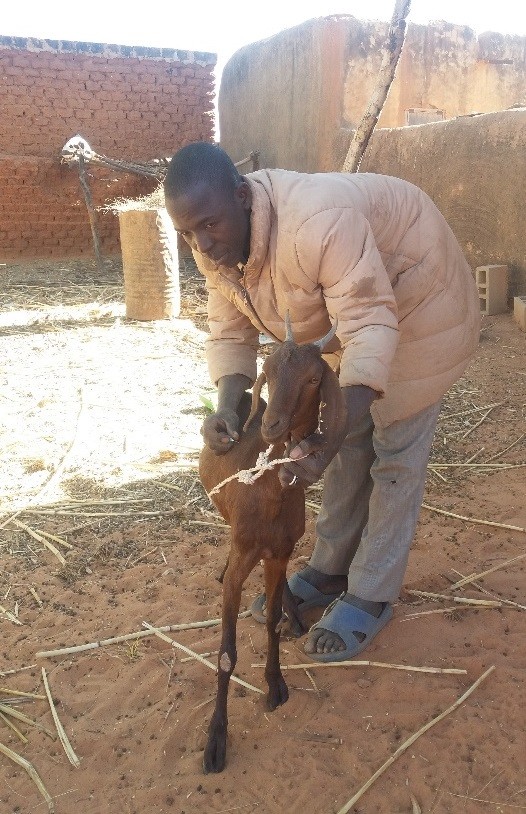Speeches Shim

October 2018 —Oumar Guindo used to work as a basic veterinary assistant, helping his supervisor veterinarian, Laya Togo, conduct vaccination campaigns and other livestock treatments in the Mopti region of Mali. Since they did not have a service delivery plan in place for these campaigns, they could not achieve a big success.
In 2015, however, Guindo received training from the USAID-supported Feed the Future Livestock for Growth (L4G) project and became an auxiliary veterinarian. He gained not only practical know-how, but he also received an auxiliary veterinarian starter kit consisting of medical supplies and professional equipment.
Thanks to the project, auxiliary veterinarians can now deliver quality health care services to farmers even in remote areas using the starter kit. As the auxiliary vets and available nearby private veterinarian services gain more clients, they are able to reinvest their profits into their microenterprises. The licensed, private vet services are either put in place by the project or, if already established, are reinforced with additional training and equipment.
Not only do farmers have a shorter distance to travel to get veterinarian services, but, because their livestock receive better care and are healthier, the animals are also more productive, resulting in greater earnings.
“I would like to thank the project for helping me to become more autonomous. In life, the ability to be autonomous, skilled and able to deliver services to others in need provides a huge personal satisfaction,” said Guindo, who works in Doundé village, located in Bankass Circle.
With the project’s help, Guindo started using more pragmatic management tools, such as keeping up good inventories, recording and archiving sales, computing gross margins, budgeting, and planning for all activities, including equipment maintenance, in a timely manner. All these tools helped him justify his product inputs and outputs with his supplier.
Guindo also learned new weighing techniques, which helped him to improve service delivery. He used to face challenges when delivering treatments because he had trouble estimating the weight of animals in order to give the proper dosage for each animal. Now, he simply wraps a specially graduated measuring tape around the animal’s thorax. The measurement provides the corresponding estimated weight.
With L4G project support, Guindo and his colleagues have avoided shortages of vaccine supply because they can purchase and store the vaccines in advance.
“My supervisor, Togo, and I greatly benefited from the improved organization of the vaccination campaign. We can now sell our products with a substantial profit margin,” said Guindo. “Our gross margin varied between U.S. $2,000 and $4,183 [per month] for vaccinations in my intervention area in Bankass for the 2016-2017 vaccination campaign.” Prior to the program’s intervention, private vet services made a monthly profit of roughly $416.
Since 2015, USAID’s L4G project has trained 79 auxiliary veterinarians, which has benefited more than 76,000 households from 800 villages in Koro and Bankass districts. The vaccination coverage also increased from about 10 percent to 22 percent, protecting over 500,000 animals. Moreover, licensed, private vets have seen their revenues quickly jump up to more than $2,000-$4,000 per month during peak demand periods.
The Livestock for Growth project, which runs from 2014 to 2019, is designed to improve Mali’s livestock production and trade to strengthen the sector’s competitiveness and increase economic growth.
LINKS
Follow @USAIDMali, on Facebook

Comment
Make a general inquiry or suggest an improvement.